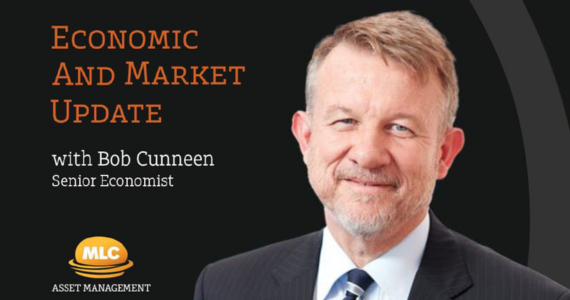Key events in April 2025
- Global share prices experienced a rollercoaster ride in April 2025. Sharp falls in share prices were recorded in early April when US President Donald Trump announced large tariff increases.
- President Trump announced a 54% tariff on Chinese imports to the US with similar high tariffs for major trading partners such as Japan (24% tariff) and Europe (20% tariff) on 2 April. President Trump also announced a 10% tariff for all countries’ imports into the US. President Trump subsequently raised China’s tariff to 145% on 9 April. These tariffs are expected to damage global trade relationships as well as raise prices for American consumers. The benchmark S&P 500 Index briefly fell -11% by 8 April before staging a strong recovery after President Trump announced a selective tariff “pause” on 9 April.
- Chinese shares disappointed as the tariffs imposed by the Trump Administration outweighed better-than-expected industrial production and retail sales data for March.
- Australian shares tracked the sharp swings in global shares but managed to end the month with strong gains. Communication Services, Information Technology and Consumer Discretionary sectors led the positive returns with more than 6% gains for April. Indeed, there was broad-based strength across industry sectors with the notable exception of the Energy sector. Energy sector shares slumped by 7.5% given the sharp slide in global oil prices.
- Australia’s economic data provides a mixed profile. There was positive news with consumer annual inflation declining to 2.4% for the March quarter. This was seen as enhancing the prospect of the Reserve Bank of Australia (RBA) lowering interest rates at their next meeting in May. There were encouraging job gains in March after February’s weak performance while unemployment remains low and stable at 4.1%. However, both business and consumer confidence have responded negatively to the ‘global tariff war’ and have been cautious given the Federal election being held on 3 May.
Asset class summary
Asset class returns in Australian dollars – periods to 30 April 2025
|
|
CYTD % | 1 month
% |
3 months
% |
1 year
% |
3 years pa % |
5 years pa % |
10 years pa % |
|
Australian shares |
0.6 | 3.6 | -3.7 | 9.5 | 6.8 | 12.1 | 7.7 |
|
Global shares (hedged) |
-2.5 | -0.4 | -5.6 | 9.7 | 9.2 | 12.1 | 8.5 |
|
Global shares (unhedged) |
-3.6 | -1.7 | -6.1 | 13.5 | 14.2 | 13.6 | 10.9 |
|
Emerging markets (unhedged) |
0.9 | -1.3 | -0.1 | 10.6 | 7.5 | 6.8 | 5.3 |
|
Australian property securities |
-0.7 | 6.3 | -5.0 | 8.9 | 5.2 | 12.3 | 7.7 |
|
Global property securities (hedged) |
0.3 | -0.4 | -1.3 | 9.0 | -3.1 | 4.3 | 2.2 |
|
Global listed infrastructure (hedged) |
4.3 | 0.2 | 3.6 | 14.9 | 3.3 | 6.9 | 6.0 |
|
Australian bonds |
3.0 | 1.7 | 2.8 | 7.1 | 2.8 | –0.2 | 2.1 |
|
Global bonds (hedged) |
2.1 | 0.9 | 1.7 | 6.5 | 1.5 | –0.6 | 1.8 |
|
Global high yield bonds (hedged) |
1.1 | 0.0 | -0.2 | 6.8 | 4.2 | 4.4 | 4.1 |
|
Australian inflation-linked bonds |
1.8 | 1.0 | 1.5 | 4.4 | 4.1 | 2.9 | 2.6 |
|
Cash |
1.4 | 0.4 | 1.0 | 4.5 | 3.7 | 2.2 | 2.0 |
|
AUD/USD |
3.3 | 2.7 | 2.6 | -1.5 | -3.4 | –0.5 | -2.1 |
Past performance is not a reliable indicator of future performance.
Sources: Australian shares – S&P/ASX 300 Total Return Index; Global shares (hedged) – MSCI All Countries World (A$ hedged, Net); Global shares (unhedged) – MSCI All Countries World in A$ (Net); Emerging markets – MSCI Emerging Markets in A$ (Net); Australian property securities – S&P/ASX 300 A-REIT Accumulation Index; Global property securities – FTSE EPRA/NAREIT Developed (A$ hedged, Net); Global listed infrastructure – FTSE Global Core Infrastructure 50/50 (Hedged $A); Australian bonds – Bloomberg AusBond Composite 0+ Yr Index; Global bonds (A$ hedged) – Barclays Global Aggregate (A$ hedged, Gross); Global high yield bonds (A$ hedged) – Barclays US High Yield Ba/B Cash Pay x Financials ($A Hedged); Australian inflation-linked bonds – Bloomberg AusBond Inflation Government 0+ Yr Index; Cash – Bloomberg AusBond Bank Bill Index; AUD/USD – WM/Reuters Daily (4 pm GMT).
Key events in global markets over the last three months to April 2025
Global shares (unhedged) posted a very weak – 6.1% negative return over the three months to April 2025. US President Trump’s aggressive agenda of raising tariffs saw share markets fall sharply in March and early April.
Wall Street’s benchmark S&P 500 Index briefly made historic highs in February but these gains were reversed by tariff concerns. Technology shares suffered particularly sharp falls with the NASADAQ posting a -11% return over the past three months.
European shares have been more resilient but still recorded a loss of -2.4% (Euro STOXX 50). The benefit of the European Central Bank cutting interest rates has cushioned European share prices.
Asian share markets delivered mixed performances. Chinese shares delivered a very strong return over the past three months with more supportive financial measures from the government. However, Japanese share markets declined with the central bank still signalling the need to raise interest rates to limit inflation.
Global bonds (hedged) delivered a solid 1.7% quarterly return. Investors have taken the view that the downside risks to global economic activity with a “tariff war” can outweigh the immediate upside inflation risks. Australian bonds delivered a strong 2.8% return as the recent lower inflation results has seen investors become more optimistic that the RBA will continue to cut interest rates this year.
Key events in Australia over the last three months to April 2025
Australian shares initially made strong gains and historic highs until the middle of February but then hit reverse gear. Australian shares delivered a disappointing return of -3.7% over the past three months. The sharpest negative returns were seen in both the Energy and Information Technology sectors with -15.3% returns. There were notable negative returns for the Health Care sector (-10.1%) and real estate (-5.0%) as investors became more cautious. There were only a few bright spots in Utilities (6.7% gain) and Consumer Staples (5.0%).
Australia’s economy is experiencing modest economic activity in terms of retail spending and housing construction. However, there are encouraging rays of sunshine with lower inflation. Australia’s annual inflation rate declined to 2.4% in the March quarter.
Global prospects
Global share prices have made very strong gains in the past two years of 2023 and 2024. The enthusiasm for Artificial Intelligence (AI) and technology have been the key factors supporting global rising share prices.
There has also been the recent tailwind of lower global inflation that allowed central banks to cut interest rates. Typically, a lower interest rate environment should be more supportive of corporate profits and thereby share prices in the long run.
However, the return of Donald Trump to the White House has generated alarm over the imposition of large tariffs on America’s key trading partners as well as smaller players like Australia. Given that tariffs are a tax that increases consumer prices, the risk of a sharp rise in US inflation is a clear and present danger. If the Trump Administration actually implements the proposed tariff increases after the current 90 day pause and if China and other trading partners retaliate, then the risk of higher inflation and weaker economic activity magnifies across the world.
Hence President Trump’s aggressive policy agenda – higher tariffs that impose more difficult trading conditions for the global economy, lower US immigration and population growth with “mass deportations” and a tougher US Federal Budget with cuts to government jobs and spending – is not a recipe for economic and financial stability.
Global share markets are also being challenged by considerable global political risks. The continuing Russian-Ukraine war and conflict in the Middle East also provides a troubling environment.
Given these complex and significant risks, investors should maintain a disciplined and diversified strategy.
Important information: This communication is provided by MLC Investments Limited (ABN 30 002 641 661, AFSL 230705) (MLC), part of the Insignia Financial Group of companies (comprising Insignia Financial Ltd, ABN 49 100 103 722 and its related bodies corporate) (‘Insignia Financial Group’). An investment with MLC does not represent a deposit or liability of, and is not guaranteed by, the Insignia Financial Group. This information may constitute general advice. It has been prepared without taking account of an investor’s objectives, financial situation or needs and because of that an investor should, before acting on the advice, consider the appropriateness of the advice having regard to their personal objectives, financial situation and needs. Past performance is not a reliable indicator of future performance. Share market returns are all in local currency. Any opinions expressed in this communication constitute our judgement at the time of issue and are subject to change. We believe that the information contained in this communication is correct and that any estimates, opinions, conclusions or recommendations are held or made as at the time of compilation. However, no warranty is made as to their accuracy or reliability (which may change without notice), or other information contained in this communication. This information is directed to and prepared for Australian residents only. MLC may use the services of any member of the Insignia Financial Group where it makes good business sense to do so and will benefit customers. Amounts paid for these services are always negotiated on an arm’s length basis. MLC relies on third parties to provide certain information and is not responsible for its accuracy, nor is MLC liable for any loss arising from a person relying on information provided by third parties. Bloomberg Finance L.P. and its affiliates (collectively, “Bloomberg”) do not approve or endorse any information included in this material and disclaim all liability for any loss or damage of any kind arising out of the use of all or any part of this material. The funds referred to herein is not sponsored, endorsed, or promoted by MSCI, and MSCI bears no liability with respect to any such funds.


